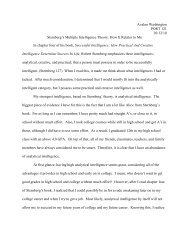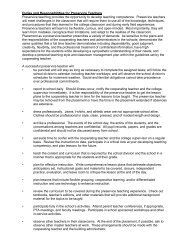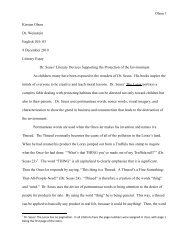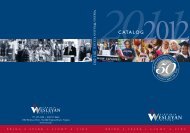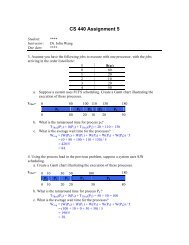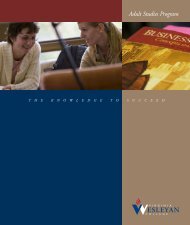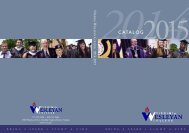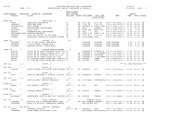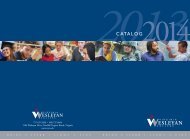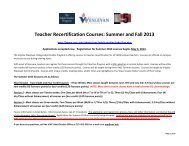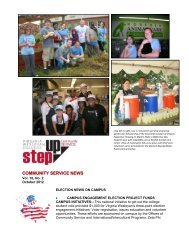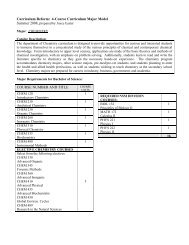2008-2009 Catalog - Virginia Wesleyan College
2008-2009 Catalog - Virginia Wesleyan College
2008-2009 Catalog - Virginia Wesleyan College
- No tags were found...
Create successful ePaper yourself
Turn your PDF publications into a flip-book with our unique Google optimized e-Paper software.
140 POLITICAL SCIENCEPHYSICAL SCIENCEDR. GARRY E. NOEDR. DEBORAH E. OTIS, Program CoordinatorPHYSICAL SCIENCE COURSES(PHSC)100 Introduction to Physical Science (3)Emphasizes the relevance of physical science inunderstanding the everyday world, and explores connectionsbetween physics and chemistry. Topics include energy,electricity, magnetism, work, heat, light, the nucleus, theatom, chemical bonds, and chemical reactions. Intended fornon-science students. Offered each fall.101 Introduction to PhysicalScience Laboratory (1)An introductory physical science lab course toaccompany PHSC 100. Students have opportunities toexplore principles common to physics and chemistrythrough hands-on exercises. Designed for non-sciencestudents. Prerequisite or corequisite: PHSC 100. Offeredeach fall.PHYSICSDR. GARRY E. NOE, Program CoordinatorAlthough the college does not offer a physics major,certain physics courses are needed in our science programs.Physics can also serve as an enrichment course for interestedstudents.PHYSICS COURSES (PHYS)141 Intro Astronomy—Solar System (3) (E)Survey of the history of astronomy; the motion ofobjects in the night sky; gravitation and relativity;telescopes; the sun, planets, moon, meteors, and comets;the origin of the solar system; space exploration; the searchfor extraterrestrial life. Designed for non-science majors.Offered each fall.142 Intro Astronomy—Stars and Galaxies (3) (E)Survey of the history of astronomy; the constellations;the nature of the stars; stellar evolution; white dwarfs,neutron stars, and black holes; the structure and evolutionof the Milky Way; other galaxies, quasars; cosmology.Designed for non-science majors. Offered each spring.143 Introduction Astronomy Lab (1)A hands-on laboratory experience which complementsPHYS 141 and 142. It has four distinct components, eachlasting two to four weeks: lunar, planetary, and deep-spaceobservations with a Celestron telescope; analyzing computersimulations, images, and film clips of celestialphenomena; Internet-as-virtual-library exercises; physicsexperiments in optics and spectroscopy. Prerequisite orcorequisite: PHYS 141 or 142. Designed for non-sciencemajors and fulfills the laboratory requirements for studentsintending to graduate with honors. Offered each spring.215 General Physics (4)An introductory non-calculus treatment of the basicprinciples of physics. Areas of study include mechanics,fluids, forms of energy, and wave motion. No previousknowledge of physics is assumed. Prerequisite: MATH 135.Lecture three hours, laboratory three hours. Offered fall ofodd-numbered years.216 General Physics (4)A continuation of PHYS 215. The principal subjectareas are optics, electricity, magnetism, relativity, andatomic physics. Prerequisite: PHYS 215. Lecture threehours, laboratory three hours. Offered spring of evennumberedyears.221 Physics (4) (E)A calculus-based introduction to kinematics, Newtoniandynamics, work and energy, gravitation, waves, fluidmechanics, kinetic theory, and thermodynamics. Prerequisite:MATH 136 or 171. Lecture three hours,laboratory three hours. Offered fall of even-numberedyears.222 Physics (4) (E)A continuation of PHYS 221. Topics include electricfields, circuit analysis, magnetism, geometrical and waveoptics, relativity and atomic structure. Prerequisite: PHYS221. Corequisite: MATH 172. Lecture three hours, laboratorythree hours. Offered spring of odd-numbered years.POLITICAL SCIENCEDR. MURRELL L. BROOKSDR. WILLIAM A. GIBSON, Program CoordinatorDR. BRETT S. HEINDLDR. DAVID J. LORENZODR. TIMOTHY G. O’ROURKEMR. RENE PEREZ-LOPEZ, (adjunct)If Aristotle is correct when he observes that the end ofpolitics is the good for man, then we may appropriatelyconclude that the study of politics—no less than a completeliberal arts education—aims at a comprehensiveunderstanding of man and human communities. Thefollowing requirements for students in political scienceinclude five major categories which subdivide the disciplineand help to articulate its many facets.I. Introductory-Level Political ScienceII. Political PhilosophyIII. American Government and PoliticsIV. Comparative Politics and International RelationsV. Constitutional Law, Public Administration andPolicy



